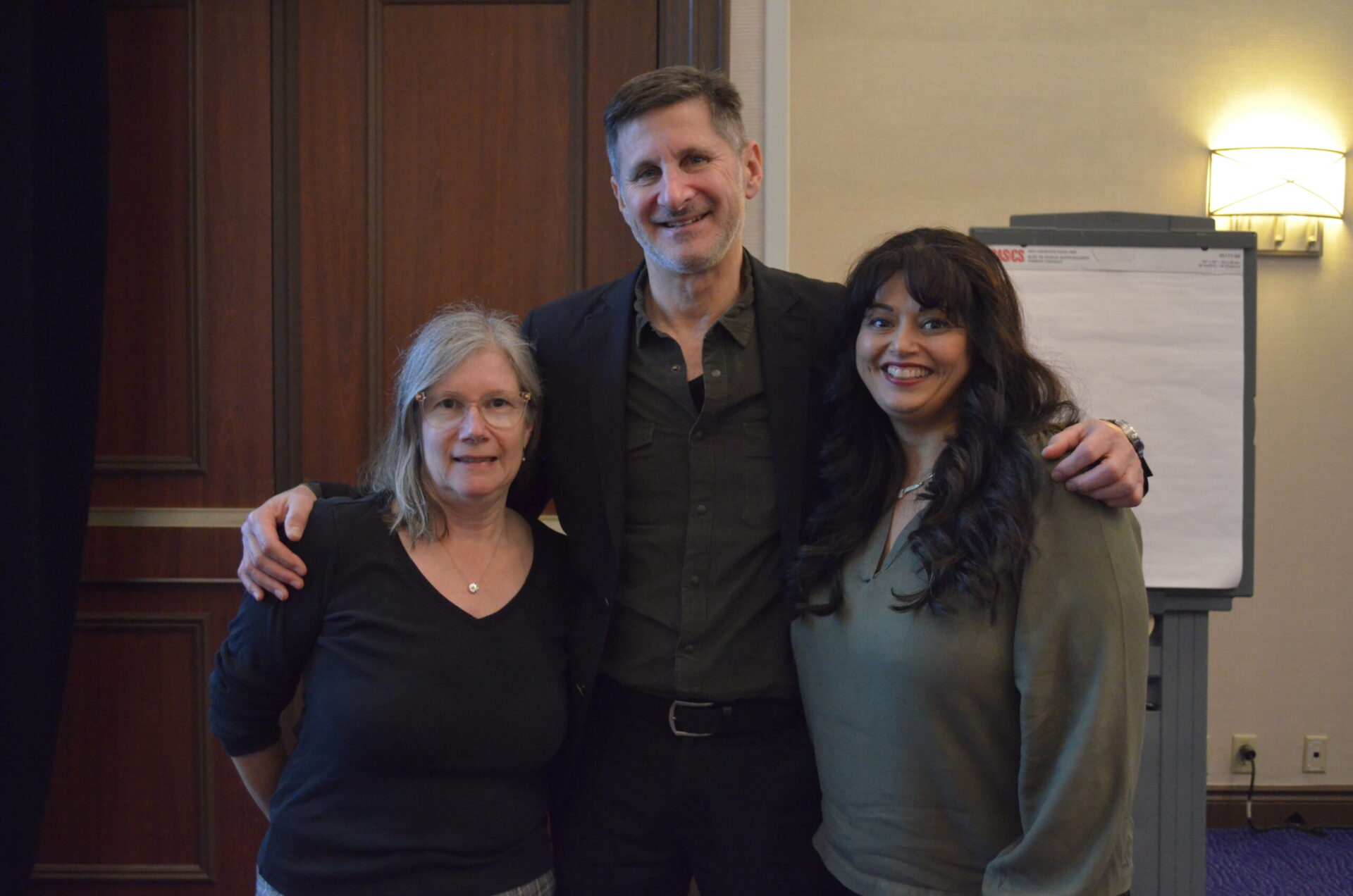Innovating Compassion: Celebrating Dr. Stephen Liben
January 25, 2024
By Nick Walling, Digital Marketing Officer, CHPCA
On October 12, 2023 at the CHPCA Conference in Ottawa, Dr. Stephen Liben, Professor in the Faculty of Medicine of McGill University and Director of the Pediatric Advanced Care Team (PACT) / Palliative Care at the Montreal Children’s Hospital since 1995, received the Pediatric Award of Excellence from CHPCA and the Canadian Network of Palliative Care for Children in recognition for his dedication to pediatric palliative care and his contributions to the field in Canada.
And while his career is a testament to his commitment to pediatric palliative care, and certainly to medicine more broadly, it wasn’t a deep-seated desire to change the world or emulate a role model that drove him to medicine. Rather, his motivations were much more practical.
“Security was very important to me because I grew up in an unstable household,” says Dr. Liben. “I did well in school though, so applying to medical school and becoming a doctor seemed like a stable, respectable way to earn a living.”
Dr. Liben began his residency at the Montreal Children’s Hospital (MCH). He immediately felt at home at MCH with its close-knit community and atmosphere. Through his interactions with the children and their parents, especially in the pediatric intensive care unit (ICU), he came to deeply appreciate the importance of that work – and those experiences caring for seriously ill children and their families drew him to pediatric care. “Part of me has always been driven towards things that felt serious or consequential,” says Dr. Liben. “I was both scared of, and also really enjoyed the excitement of the ICU, so that’s what I ended up specializing in.”
His experiences in the pediatric ICU and at MCH opened his eyes to gaps in the healthcare system, and to a lot of unnecessary suffering. “Kids were being treated because that’s just what was supposed to happen rather than because it was best for the child or their family,” recounts Dr. Liben. “Sometimes, all the clinicians knew the child had very little time left, and it was often being wasted with unhelpful and even painful tests and procedures.” Because of his observations in the pediatric ICU, Dr. Liben began making small interventions explicitly to reduce suffering. “The simple act of asking questions, such as ’why can’t we send this child home today since that is the thing, they want most in the world?’ would then initiate a cascade of events that would often get the child home much sooner – something that is so important when a child perhaps only has days to live”. Those small acts were making a substantial difference to the children and families he was caring for and opened his eyes to new possibilities for him as a physician.
“I saw that changing the way I communicated with parents and helping them deal with death, dying and suffering was really impacting people,” he says. “And while I was becoming a better communicator, I saw an opening – a new, multi-dimensional field that would allow me to engage with families in the same way as in the ICU, but less technologically oriented and speaking more to the deepest values of the children and their parents.”
Dr. Liben’s move to practicing pediatric palliative care as the director of pediatric palliative at the Montreal Children’s Hospital was rare for the time, as the field was only in its infancy. However, he’s quick to point out that he was far from the first practitioner to do so. “A good friend of mine in Halifax, Dr. Geri Frager, worked in the space as well and we would often swap notes and talk to each other about difficult cases,” remembers Dr. Liben. “I also spent time with Dr. Ann Goldman in the UK. In fact, when I was offered the job, at the MCH, I insisted they send me to London for a month to study under her or I wouldn’t take it!”
Progress, change, and innovation are particularly important to Dr. Liben, and throughout his career, he has learned much about what it takes to help forge a path forward.
“Over the years, I’ve learned you need three things to really make a difference: patience, timing, and patience,” advises Dr. Liben. “In my early years I didn’t really appreciate this, as I pushed really hard and wasted a lot of energy.”
He recalls a time where the Montreal Children’s Hospital didn’t offer a bereavement follow up program for parents, when many other facilities across the country were. Seeing this, Dr. Liben put in application after application asking for funding, all ending in rejection. “All of a sudden, one parent made a complaint to the Children’s Hospital that they never received any bereavement follow ups,” remembers Dr. Liben. “And because I already had the applications ready, I was able to get the ball rolling and obtain funding for a program. Patience and timing.” His tenacity had finally paid off.
As an early practitioner of pediatric palliative care, Dr. Liben was a part of many innovations and milestones in the field. And though the word ‘pride’ does not resonate with him, he is extremely grateful to have been a part of two projects in particular – the first being the establishment of Montreal’s first children’s hospice, Le Phare.
“Almost 30 years ago, myself and two or three colleagues would meet for lunch and talk about how we needed to have a children’s hospice in Montreal,” he recalls. “Because we were falling behind in Quebec, you know?” Thanks to their efforts all those years ago, Le Phare has been supporting children with life-shortening illnesses and their families for almost 25 years. “I’m really happy that that place exists for the children and their families,” says Dr. Liben. “Not only for end-of-life, but also for respite care, and everything else Le Phare does for the children in the Montreal area.”
Dr. Liben was also involved with getting pediatric palliative care recognized as a subspeciality by the Royal College of Physicians and Surgeons in Canada. “What that means is that now, there’s two years of formal training required to do what I do – you can’t just go to London for a month and meet somebody anymore!” jokes Dr. Liben. “I’m really proud to have been a small part in that movement because it’s a stamp of approval – an indicator of rigors and standards – and ultimately a sign of respect to the field.”
Suffering is universal, and though palliative care practitioners are in the business of reducing it, they are not immune to it. During his own self-care journey, Dr. Liben found that mindfulness and meditation were invaluable. “Like most people, I got into it because I was suffering and was fed up enough to try something as wacky as meditation,” says Dr. Liben. “It doesn’t quite solve anything on its own, but it helps you to live with the way things are. And there’s less suffering with that.”
With a stack of books on mindfulness growing on his bedside table, Dr. Liben began wondering: how could he incorporate mindfulness in his career as a professor and palliative care practitioner?
“A colleague and I, Tom Hutchison, created this mindfulness course and we convinced McGill University to make it mandatory, for all medical students” says Dr. Liben. “Every medical student has to take it now, and while it has elements of mindfulness, it’s really about communication and dealing with the difficult emotions that challenge all physicians.”
The course is focused on making the physicians of the future happier, compassionate, and more human – a side of medical practice that is often overlooked. These skills help them navigate those difficult conversations with patients and their families, especially when those conversations involve death and dying.
“Death is really the ultimate taboo, and mindfulness kind of helps at least create a space to have the conversations that need to happen,” says Dr. Liben. “In pediatric palliative care, yes, we’re doing symptom control, but that’s not the hard part. The hard part is dealing with people refusing to accept what’s already happening – and what’s already happened.”
Improving the communication skills of practitioners is a large part of Dr. Liben’s hope for the future of palliative care – a future where humanity and empathy are prioritized as much as or more than procedure and technical precision. “I think we need to raise expectations about the standards of communication of all healthcare practitioners,” says Dr. Liben. “Not only do we need to start teaching students about the communication challenges they may face and how to deal with them, but we need to continue teaching them when they become post-graduate students and residents.”
And Dr. Liben has seen first-hand, time after time, the effect that building relationships and communicating with humanity and compassion at the forefront has on the children and their families in his care.
“My favourite part of the job is connecting with people, really connecting with people – and seeing that you’re making a difference,” says Dr. Liben. “When you go to a child’s funeral and the family’s hugging you, introducing you to everybody and thanking you for what you and your team did. It’s almost embarrassing, but it really drives home the fact that you were able to have a positive impact during an incredibly difficult time in their lives.”
Congratulations to Dr. Liben for his well-deserved award. As he heads into semi-retirement, he leaves behind a legacy of innovation, collaboration, and dedication to the well-being of palliative patients across Canada.
CHPCA Asked: What song would you want played at your funeral?
The Beatles – Let it Be
Have an article you’d like to submit?
Contact us at: [email protected]



